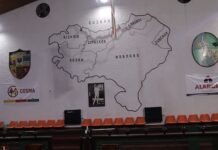Rocío Silva Santisteban writes to us today, in her column at the Peruvian daily La República, a beautiful and very educational article about a Universal Basque: Portugalete-born Ignacio Ellacuria.
Reading it has made us again reflect about the treatment we Basques give our most illustrious fellow countrymen. Ignacio Ellacuria is part of that group of Basques who’s had an extraordinary influence both on society as a structure and on the lives, opportunities, and hopes of many specific people.
Ignacio Ellacuria was born in Portugalete, and as a boy studied in Tudela and Azpeitia; he trained as a Jesuit in El Salvador, Peru, and Germany, and he carried out his calling as a human being, Christian, Jesuit, and defender of the poor in El Salvador. That work caused him to be martyred, murdered alongside seven others, the UCA Martyrs, at the hands of the Armed Forces of El Salvador.
He became a part of an extraordinary group of Christians, among them a good handful of Basques, who created the Christian theological movement of the Liberation Theology, which is characterized by considering that the Gospel demands preferential option for the poor.
His life and his work, which are extraordinarily important, are largely unknown by most of us. Yes, he has been recognized. Foundations, church leaders, streets, and institutions bear his name. But we can’t say he’s well-known among Basques. This may be because he made the mistake of devoting himself to education, the defense of justice and freedom, and not scoring goals. That would explain, obviously, why the media don’t dedicate too much time to him.
It seems that talking about those saints and martyrs of Christianity (like those of the Theology of Liberation) is rather frowned on by some Catholic leaders, who have even prohibited having conferences about them in a church.
This article by Basque theologian Xabier Pikaza Ibarrondo, written on the 25th anniversary of his murder,is worth reading. He knew him personally, and this text helps us to understand and get to know him better. We can’t help highlighting, from among all the memories Mr. Pikaza recalls, his reference to “how Basque” Ellacuria was::
Sobre su origen vasco. No era vasco “militante” en el sentido nacionalista del término, pero era muy vasco, muy universal. Así me comentaba con humor que a finales de los años 40 les mandaron a él y a otros compañeros vascos a América… para hacer el noviciado y evitar así el peligro de nacionalismo militante vasco de sus orígenes familiares. “Nos mandaron a América ‒ me decía‒ porque en Euskadi podíamos ser “revolucionarios” en pequeño…, y en América nos hemos hecho partidarios de una revolución universal, en línea de libertad cristiana”.
(On his Basque origin. He wasn’t a “militant” Basque in the Nationalistic sense of the word, but he was very Basque, very universal. He once joked with me that he and other Basque compatriots were sent to the New World at the end of the 1940s…to do their novitiate and thereby avoid the danger of the militant Basque Nationalism of their family origins. “They sent us to the New World,” he told me, “because in the Basque Country, we could be little ‘revolutionaries,’ … and in the New World, we’ve become part of the universal revolution, along the lines of Christian freedom”.)
There is no doubt that that, too, is “very Basque.”
That’s why we’re so grateful to Rocío Silva Santisteban for her thoughts in her column, which have refreshed our memory, and given us a magnificent excuse to share a memory of this “Basque-Salvadoran-human being” with our readers. In her article, she says that she’s always had the feeling that he was owed something. We, in the case of Ellacuria and so many others, also do. May this serve as a small reminder to “pay back” a small part of that debt.
Luckily, as Juan José Tamayo, the director of the Ignacio Ellacuria School of Theology and Religious Sciences at Charles III University in Madrid, remembers in this article written on the 25th anniversary of his murder, that the memory, the example, and the intellectual legacy of Ellacuria is still alive among those who continue to defend a Church for the poor.
By the way, were there any doubts, those murderers were never tried.
La Republica – 1/12/2015 – Peru
Ellacuría
Siempre tuve la sensación de que a Ellacuría le debía algo: no lo he conocido, lo he leído pero no a profundidad, supe de su vida y de su muerte, pero hoy en medio de curas pedófilos y órdenes fascistas que instituyen una jerarquía eclesiástica de cara a sus agendas perversas, mirando de reojo a los pobres como si solo merecieran caridad, pues regreso a la imagen de un sacerdote terco, honesto, intelectual sobre todo, rebelde y con una claridad meridiana sobre su objetivo en este mundo: la opción preferencial por los pobres.
(Follow) (Automatic translation)
Last Updated on Dec 20, 2020 by About Basque Country





